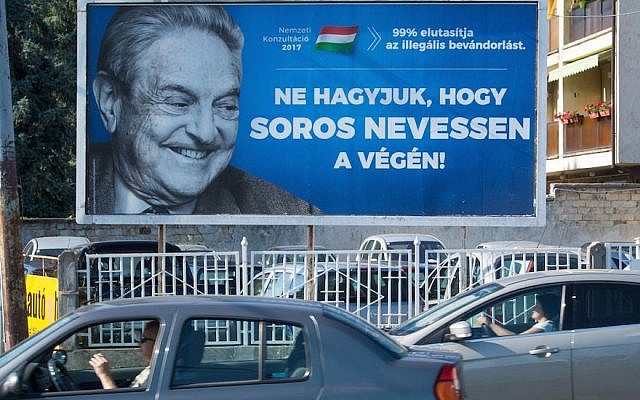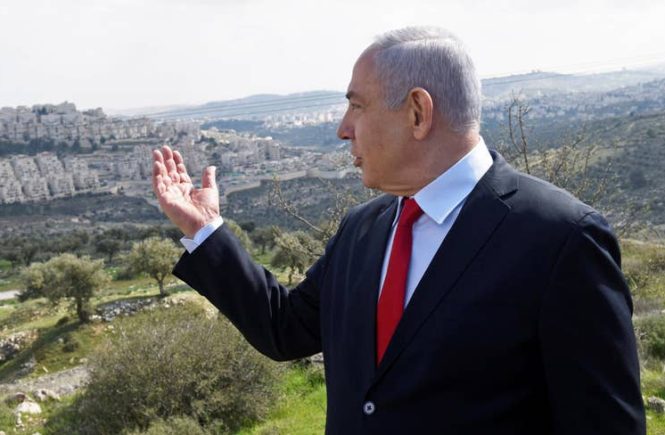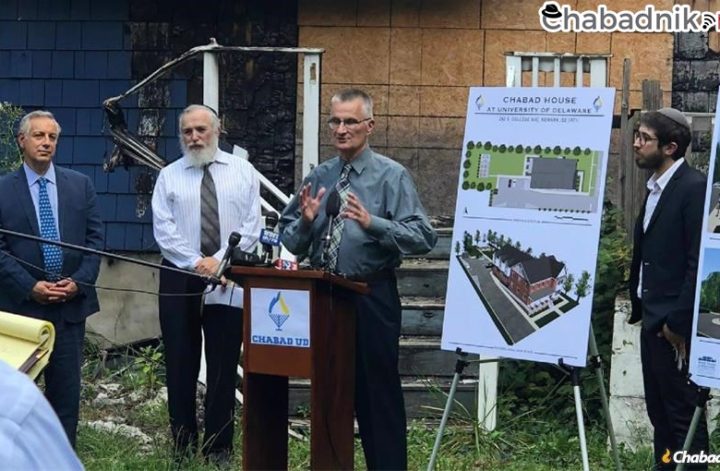PARIS — A senior Hungarian official and close ally of President Victor Orban said Monday that his premier and Prime Minister Benjamin Netanyahu “belong to the same political family,” in a speech lauding Budapest’s efforts to combat anti-Semitism.
“Relations [between our countries] are quite strong. The Israeli government knows very well that Hungary is doing its very most to protect Hungarian Jewry,” State Secretary Vince Szalay-Bobrovniczky said at a conference on anti-Semitism organized by the European Jewish Association in Paris. “Jews in Hungary have nothing to be afraid of, at least in our knowledge today.”
Szalay-Bobrovniczky said that one particular issue where Jerusalem and Budapest see eye-to-eye is immigration. “[Israel] understands what we are doing on our southern borders,” the state secretary said, referring to Hungary’s efforts to block immigration.
Orban’s right-wing government has instituted a series of restrictive changes in recent years to the country’s asylum and immigration laws that have made it nearly impossible for asylum-seekers presenting their applications at the Serbian border to win protection in Hungary.
Part of Orban’s campaign on the issue has included the targeting of George Soros with ads across the country claiming the Jewish billionaire philanthropist is supporting illegal immigration. The campaign has been criticized as anti-Semitic, but the Hungarian leader has rejected the allegation.
Speaking to dozens of Jewish community leaders from across Europe on Monday at the EJA conference, Szalay-Bobrovniczky doubled down on the accusation against Soros, claiming that the Hungarian native currently living in New York is “persona non-grata in Israel… and nobody can call Israel anti-Semitic.”
A spokesman for the Strategic Affairs Ministry refuted the secretary’s claim, saying no such ban against Soros exists.
Szalay-Bobrovniczky elaborated on his country’s ties with the Jewish state in an interview with The Times of Israel on the sidelines of the EJA conference, saying that Jerusalem understands Hungary’s closing of its borders because “illegal Muslim migration is importing anti-Semitism into Europe.”
Hungary-Israel Business Forum in Budapest, Hungary, on July 19, 2017. (Haim Zach/GPO/Flash90)
PARIS — A senior Hungarian official and close ally of President Victor Orban said Monday that his premier and Prime Minister Benjamin Netanyahu “belong to the same political family,” in a speech lauding Budapest’s efforts to combat anti-Semitism.
“Relations [between our countries] are quite strong. The Israeli government knows very well that Hungary is doing its very most to protect Hungarian Jewry,” State Secretary Vince Szalay-Bobrovniczky said at a conference on anti-Semitism organized by the European Jewish Association in Paris. “Jews in Hungary have nothing to be afraid of, at least in our knowledge today.”
Szalay-Bobrovniczky said that one particular issue where Jerusalem and Budapest see eye-to-eye is immigration. “[Israel] understands what we are doing on our southern borders,” the state secretary said, referring to Hungary’s efforts to block immigration.
Get The Times of Israel’s Daily Edition by email and never miss our top stories Free Sign Up
Orban’s right-wing government has instituted a series of restrictive changes in recent years to the country’s asylum and immigration laws that have made it nearly impossible for asylum-seekers presenting their applications at the Serbian border to win protection in Hungary.
Part of Orban’s campaign on the issue has included the targeting of George Soros with ads across the country claiming the Jewish billionaire philanthropist is supporting illegal immigration. The campaign has been criticized as anti-Semitic, but the Hungarian leader has rejected the allegation.
Speaking to dozens of Jewish community leaders from across Europe on Monday at the EJA conference, Szalay-Bobrovniczky doubled down on the accusation against Soros, claiming that the Hungarian native currently living in New York is “persona non-grata in Israel… and nobody can call Israel anti-Semitic.”
A spokesman for the Strategic Affairs Ministry refuted the secretary’s claim, saying no such ban against Soros exists.

This poster, featuring US billionaire George Soros, in Szekesfehervar, Hungary, was part of a government campaign, July 6, 2017. (Attila Kisbenedek/AFP/Getty Images.File)
Szalay-Bobrovniczky elaborated on his country’s ties with the Jewish state in an interview with The Times of Israel on the sidelines of the EJA conference, saying that Jerusalem understands Hungary’s closing of its borders because “illegal Muslim migration is importing anti-Semitism into Europe.”
The state secretary equated Hungary’s immigration policy to that of Israel’s. “If you see what Israel is doing with its borders vis-a-vis the Arab countries and the African migrants, it’s obvious…. They are defending their borders and they are defending their inhabitants from possible security threats.
“We are doing the same thing,” Szalay-Bobrovniczky asserted.
He went on to highlight his country’s blocking of EU and UN resolutions targeting Israel, saying Budapest had just made one such move several months ago. He appeared to have been referring to a November joint EU statement condemning the US decision to no longer consider Israeli settlements illegal, which a diplomatic official told The Times of Israel that Hungary had blocked.
“I’m not saying that everything will be blocked, but we veto resolutions that we do not agree with, such as ones that would condemn Israel as an apartheid state,” Szalay-Bobrovniczky said.
He also boasted of Hungary’s decision to establish a trade office in Jerusalem, clarifying that a subsequent embassy move to Israel’s capital “is not currently on the agenda,” but that the trade office “was a gesture toward Israel and a gesture to the American administration, with whom we are quite close”
Echoing the words of the State Department’s Special Envoy against anti-Semitism from earlier at the conference, Szalay-Bobrovniczky called US President Donald Trump “the most philo-Semitic [president] and Orban sees eye to eye on this issue.”
Shlomo Koves, who heads the Chabad-affiliated EMIH Unified Hungarian Jewish Congregation and created the Action and Protection League to combat anti-Semitism in Europe, took a slightly more tempered approach. The Jewish community leader said that he did not believe in the “conspiracy theory” against Soros, but also did not think the Hungarian government’s campaigns against him were anti-Semitic.
Koves cited a recent APL poll that asked respondents whether they linked Soros with his Judaism, and just 2% of participants responded in the affirmative.
Moreover, he pointed out that the situation for Jews in Hungary is far better than other European countries, with just 35 anti-Semitic incidents in the past year, just one of which was of a physical nature, according to APL statistics. Comparably, the number such attacks in other European countries such as the UK, France, the Netherlands and Austria was in the hundreds in 2019.
Koves credited Orban’s immigration policy for the relatively low numbers, saying that he was keeping out Muslim extremists that have been responsible for some of the more violent attacks on Jews in other European countries in recent years.
However, some Jewish leaders in Hungary do not speak as highly of the government. Rabbi Zoltan Radnoti, the chairman of the rabbinical council of the Mazsihisz liberal-leaning Jewish umbrella group in Hungary, said that “while Jews are not being attacked in the streets, the Orban administration has employed rhetoric that gives a sense of anti-Semitism that has made many Jews uncomfortable.”
Moreover, Radnoti said that Koves’s Chabad-affiliated EMIH is heavily supported by the government and that his views on Orban’s performance are therefore clouded. Indeed last year, Deputy Prime Minister Zsolt Semjén signed a document that gave EMIH “special status” – recognition enjoyed by several churches and Mazsihisz, the country’s largest federation of Jewish communities.




